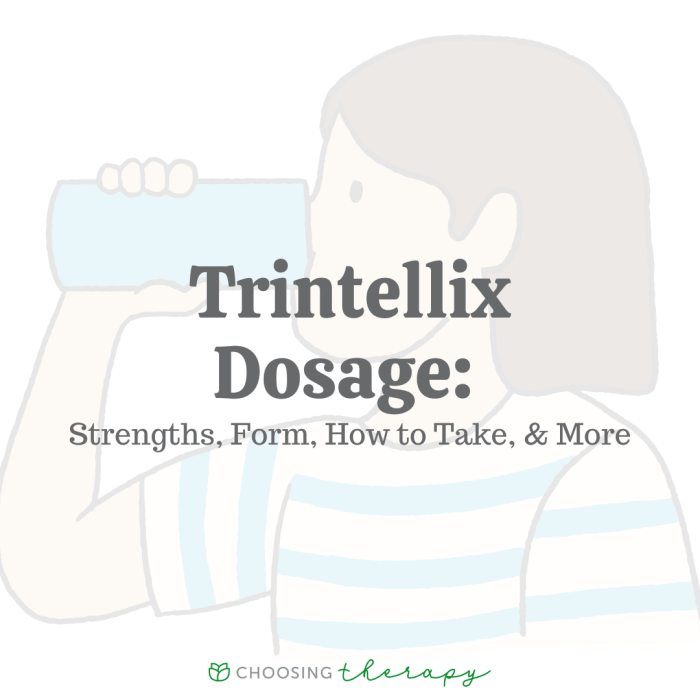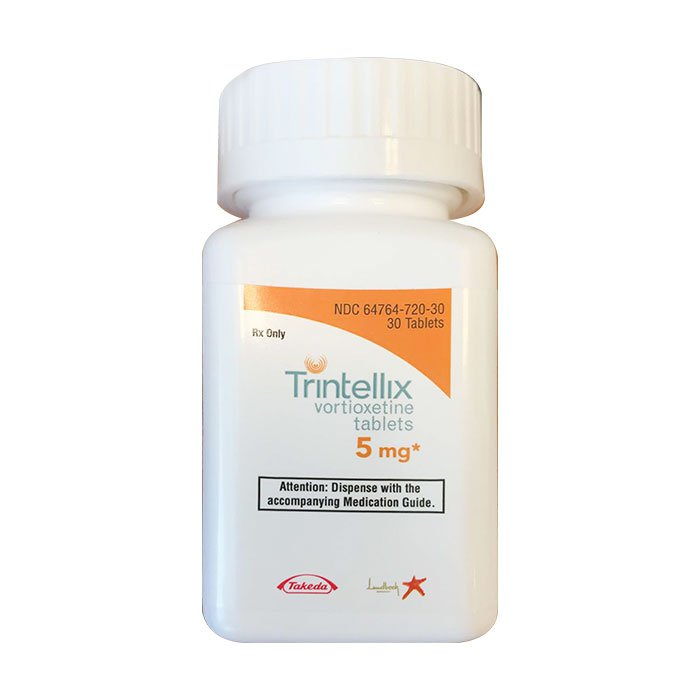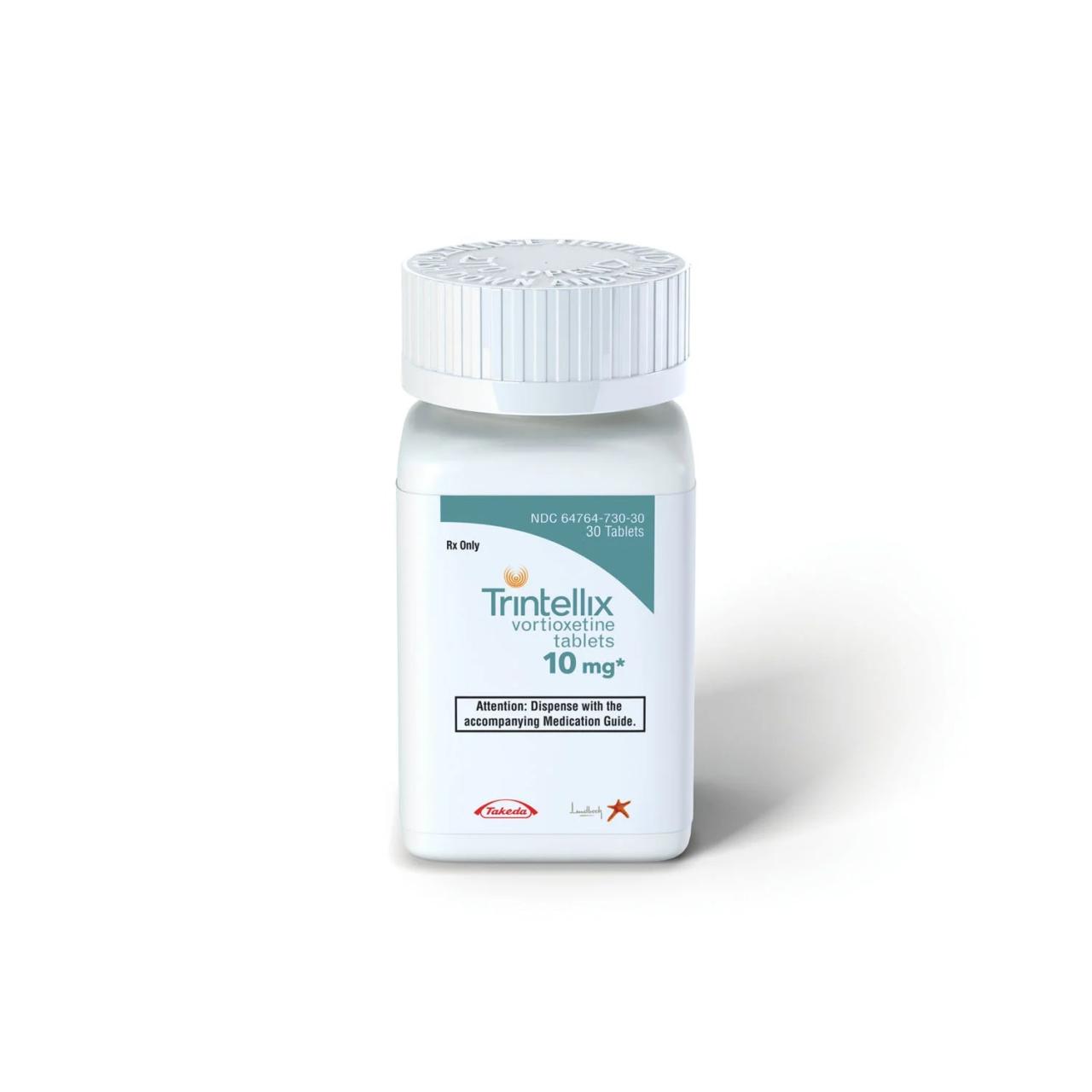Trintellix, also known as vortioxetine, stands out as a unique antidepressant, setting itself apart from traditional medications by targeting a broader range of neurotransmitters in the brain. This innovative approach offers potential benefits for individuals seeking relief from depression and other mental health conditions.
This guide delves into the intricacies of Trintellix, covering its mechanism of action, clinical applications, dosage and administration, potential side effects, and comparisons to other antidepressants. We explore its impact on patients, ethical considerations, and the vital role of healthcare professionals in its management.
Comparison to Other Antidepressants: Trintellix

Trintellix (vortioxetine) is a relatively new antidepressant that has gained popularity in recent years. It belongs to a class of medications called serotonin modulators, which work by affecting the levels of serotonin in the brain. Like other antidepressants, Trintellix is used to treat major depressive disorder (MDD) and other mental health conditions.
While Trintellix has proven to be an effective treatment option for many individuals, it is important to compare it to other commonly prescribed antidepressants to understand its strengths and weaknesses. This comparison will explore the advantages and disadvantages of each medication, focusing on efficacy, side effects, and cost.
Comparison of Trintellix to Other Antidepressants
This section provides a comparative analysis of Trintellix against other frequently prescribed antidepressants. The comparison considers key aspects like efficacy, side effects, and cost, offering a comprehensive overview to aid in treatment decisions.
| Medication | Class | Efficacy | Common Side Effects | Cost |
|---|---|---|---|---|
| Trintellix (vortioxetine) | Serotonin Modulator | Generally effective for MDD, may also be helpful for anxiety. | Nausea, headache, dizziness, constipation, sexual dysfunction. | Moderate, may vary depending on insurance coverage. |
| SSRIs (Selective Serotonin Reuptake Inhibitors) | SSRI | Widely effective for MDD, some also used for anxiety disorders. | Nausea, headache, sexual dysfunction, weight gain, insomnia. | Generally affordable, many generic options available. |
| SNRIs (Serotonin-Norepinephrine Reuptake Inhibitors) | SNRI | Effective for MDD, some may also be helpful for anxiety and pain conditions. | Nausea, headache, increased blood pressure, sweating, insomnia. | Moderate, may vary depending on insurance coverage. |
| Tricyclic Antidepressants (TCAs) | TCA | Effective for MDD, some also used for chronic pain and migraines. | Drowsiness, dry mouth, constipation, blurred vision, weight gain. | Generally affordable, many generic options available. |
| MAOIs (Monoamine Oxidase Inhibitors) | MAOI | Effective for MDD, particularly for atypical depression. | Dietary restrictions, potential for drug interactions, orthostatic hypotension. | Moderate, may vary depending on insurance coverage. |
Advantages and Disadvantages of Trintellix
Trintellix offers several advantages over other antidepressants, including its unique mechanism of action, potential for broader symptom relief, and a relatively low risk of sexual side effects. However, it also has certain disadvantages, such as a higher cost compared to some other options and a potential for certain side effects.
Advantages of Trintellix
- Unique Mechanism of Action: Trintellix works by modulating serotonin levels in the brain, but it also has additional effects on other neurotransmitters, such as dopamine and norepinephrine. This unique mechanism may contribute to its broader symptom relief, potentially addressing not just mood but also anxiety and cognitive function.
- Potential for Broader Symptom Relief: Some studies suggest that Trintellix may be effective in treating a wider range of symptoms associated with depression, including anxiety, fatigue, and cognitive impairment. This may be due to its multi-target mechanism of action.
- Lower Risk of Sexual Side Effects: Compared to some other antidepressants, particularly SSRIs, Trintellix appears to have a lower risk of causing sexual side effects like erectile dysfunction and decreased libido. This may be an advantage for individuals who are concerned about these side effects.
Disadvantages of Trintellix
- Higher Cost: Trintellix is generally more expensive than some other commonly prescribed antidepressants, especially generic options. This cost difference may be a factor for individuals with limited financial resources.
- Potential Side Effects: Like other antidepressants, Trintellix can cause side effects, although these are generally mild and manageable. Common side effects include nausea, headache, dizziness, constipation, and sexual dysfunction.
- Limited Long-Term Data: Trintellix is a relatively new medication, and long-term data on its safety and efficacy is still limited. More research is needed to fully understand its long-term effects.
Future Research and Development
Trintellix, like many other medications, is a subject of ongoing research and development. Researchers are continuously investigating new potential applications, exploring ways to improve its efficacy, and seeking to optimize its delivery methods. This section delves into the ongoing research related to Trintellix, examines its potential future applications, and analyzes the possibilities for enhanced formulations or delivery methods.
Ongoing Research
Ongoing research related to Trintellix focuses on several key areas, including:
- Understanding its mechanism of action: Researchers are working to fully understand how Trintellix interacts with the serotonin receptors in the brain. This research aims to shed light on the drug’s effectiveness in treating various mental health conditions.
- Exploring its efficacy in other conditions: While Trintellix is currently approved for the treatment of major depressive disorder (MDD), researchers are investigating its potential use in other mental health conditions such as anxiety disorders, obsessive-compulsive disorder (OCD), and post-traumatic stress disorder (PTSD). This research aims to expand the drug’s therapeutic applications.
- Investigating its long-term effects: Researchers are studying the long-term safety and effectiveness of Trintellix, particularly in terms of its impact on cognitive function, mood stability, and overall well-being. This research is crucial for ensuring the drug’s long-term safety and efficacy.
- Evaluating its potential for combination therapy: Researchers are exploring the potential of combining Trintellix with other medications or therapies to enhance treatment outcomes for mental health conditions. This research aims to optimize treatment strategies and improve patient outcomes.
Patient Experiences
Trintellix, like other antidepressants, has a diverse range of effects on individuals. While it has shown promise for many, its impact varies greatly, highlighting the importance of individual experiences and personalized treatment plans.
Experiences with Trintellix
Here are some real-life experiences shared by individuals who have taken Trintellix:
- Many patients report feeling a significant improvement in their mood and overall well-being. They describe experiencing a decrease in symptoms of depression, such as sadness, hopelessness, and loss of interest in activities. Some individuals even report feeling a sense of joy and energy that they hadn’t felt in a long time.
- Some patients have experienced a reduction in anxiety symptoms, such as excessive worry, nervousness, and restlessness. Trintellix’s ability to address both depression and anxiety makes it a valuable option for individuals struggling with co-occurring conditions.
- Others report a positive impact on their sleep patterns. They experience fewer difficulties falling asleep and staying asleep, leading to improved energy levels and overall well-being.
- While many patients report positive experiences, some may experience side effects. Common side effects include nausea, dizziness, drowsiness, and constipation. These side effects are usually mild and tend to subside over time. It is important to discuss any concerns with a healthcare professional.
Ethical Considerations

Prescribing any medication, especially a psychotropic drug like Trintellix, involves a complex interplay of ethical considerations. It’s crucial to balance the potential benefits of treatment with the risks and ensure that patient autonomy and informed consent are respected.
Informed Consent and Patient Autonomy
Informed consent is a cornerstone of ethical medical practice. Patients must be provided with comprehensive and understandable information about the risks, benefits, and alternatives to Trintellix treatment. This information should be presented in a clear and accessible manner, allowing patients to make informed decisions about their care.
“Informed consent ensures that patients understand the nature of their illness, the proposed treatment, and the potential risks and benefits involved.”
- Understanding the Risks: Patients need to be informed about the potential side effects of Trintellix, including common side effects like nausea, dizziness, and insomnia, as well as rarer but more serious side effects like suicidal thoughts or actions. This information should be presented in a balanced way, highlighting the potential benefits while acknowledging the risks.
- Alternative Treatment Options: Patients should be informed about other treatment options, including non-pharmacological approaches like therapy, lifestyle changes, and support groups. This allows patients to make a truly informed decision about the best course of action for them.
- Patient Autonomy: The informed consent process empowers patients to make decisions about their own healthcare. Patients have the right to refuse treatment, even if their healthcare provider recommends it.
Potential for Misuse or Abuse
While Trintellix is generally considered safe when used as prescribed, there is a potential for misuse or abuse. This is particularly relevant given the addictive potential of certain medications in the same class as Trintellix.
- Risk of Dependence: Although Trintellix is not a controlled substance, there is a risk of dependence, especially with long-term use. This means that patients may experience withdrawal symptoms if they abruptly stop taking the medication.
- Mixing with Other Substances: Mixing Trintellix with other substances, including alcohol or other medications, can increase the risk of adverse effects. It’s essential to inform patients about these risks and encourage them to be honest about their substance use history.
- Dosage and Monitoring: Misuse can also occur due to improper dosage or lack of monitoring. Regular follow-up appointments with a healthcare provider are essential to ensure that the medication is being used safely and effectively.
Role of Healthcare Professionals

Healthcare professionals play a crucial role in managing patients on Trintellix. They are responsible for ensuring the safe and effective use of this medication, addressing potential side effects, and monitoring patient progress. This involves a multi-faceted approach, including careful patient assessment, ongoing monitoring, and providing appropriate education and support.
Patient Assessment and Monitoring
The initial assessment of a patient considering Trintellix is paramount. Healthcare professionals must conduct a thorough evaluation, considering the patient’s medical history, current medications, and potential risk factors. This includes assessing the severity of the patient’s depression, identifying any potential contraindications, and discussing potential side effects. Ongoing monitoring is essential to evaluate the effectiveness of Trintellix and adjust treatment as needed. This involves regular follow-up appointments to assess symptom improvement, monitor for any adverse effects, and adjust the dosage if necessary.
Best Practices for Patient Education and Support
Providing patients with comprehensive information about Trintellix is crucial to ensure its safe and effective use. This includes explaining the medication’s mechanism of action, potential benefits and risks, and proper dosage and administration. Healthcare professionals should also address common concerns and misconceptions, emphasizing the importance of adherence to the prescribed treatment plan. In addition to providing factual information, healthcare professionals should offer emotional support and encouragement. This can help patients feel empowered to manage their condition and overcome challenges associated with depression.
Communication and Collaboration, Trintellix
Open and honest communication is essential for effective patient management. Healthcare professionals should encourage patients to openly discuss their concerns, experiences, and any challenges they may face. This includes addressing potential side effects, medication adherence, and any changes in their emotional state. Additionally, healthcare professionals should collaborate with other members of the patient’s healthcare team, such as therapists or counselors, to ensure a comprehensive and holistic approach to treatment.
Patient Education Resources
Healthcare professionals can leverage various resources to support patient education and understanding of Trintellix. These include:
- Patient information leaflets provided by the pharmaceutical company
- Online resources and websites dedicated to depression and its treatment
- Support groups and online forums for individuals with depression
- Educational videos and materials tailored to patient comprehension
Trintellix represents a promising development in the field of antidepressants, offering a novel approach to treating mental health conditions. While further research is ongoing, its unique mechanism of action and potential benefits warrant careful consideration for individuals seeking effective treatment options. Understanding the complexities of Trintellix, from its mechanism to its potential side effects, empowers patients and healthcare providers to make informed decisions regarding its use.
Trintellix is an antidepressant that works by increasing serotonin levels in the brain. While it’s effective for many, some individuals may experience side effects. In cases of severe autoimmune disorders, a different approach might be necessary. A medication like eculizumab , which targets the complement system, could be considered. Ultimately, the best treatment for any condition depends on the individual’s specific needs and circumstances, so it’s crucial to consult with a healthcare professional to determine the most appropriate course of action.